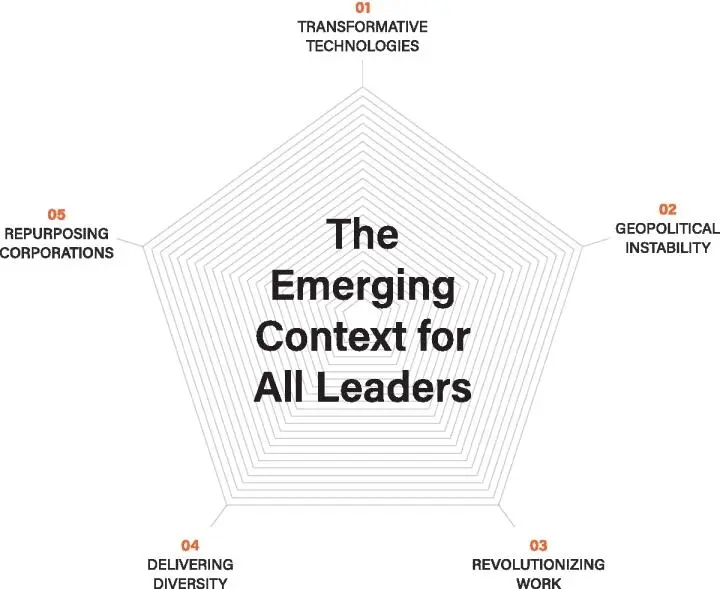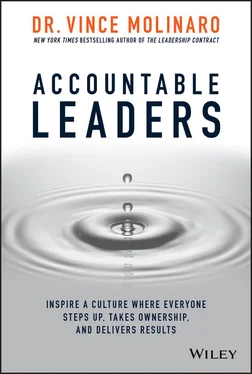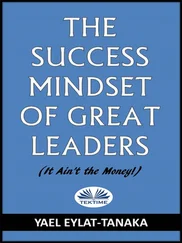2 Leaders and companies do not fail or succeed in a vacuum. The interplay among the context, business environment, and how leaders respond is critical to success.
3 Leaders must understand their emerging context, for it impacts their ability to adapt and spot opportunities that may fuel growth and create value for shareholders and society.
These conclusions point to the need for you as a leader to take the time to understand the context in which you are leading. This is something my teams and I have always helped leaders do in our leadership development programs. Every program is rooted in the current and emerging context of the leaders we work with. We help them learn the skills they need to pay attention to their operating environment and appreciate how they need to step up and lead in times of change. The bottom line is that you need to be clear on what is coming at you, how to make sense of it, and how to lead your team or company through it all. 17
The Emerging Context for All Leaders
In all my research and conversations with leaders like you, I’ve come to appreciate the key drivers that are reshaping our world. Collectively, these drivers are changing the old game and bringing about a new one. Below, I touch briefly on what I see as the top five drivers that all leaders need to pay attention to, today and tomorrow (see Figure 1.1). This is by no means an exhaustive list, but in my discussions with senior executives, these seem to be the ones they are paying attention to and even worried about.

Figure 1.1 The Emerging Context for All Leaders
1. Transformative Technologies
Klaus Schwab, the founder and executive chairman of the World Economic Forum, recently wrote: “We stand on the brink of a technological revolution that will fundamentally alter the way we live, work, and relate to one another. In its scale, scope, and complexity, the transformation will be unlike anything humankind has experienced before.” 18
Schwab nicely captures today’s reality. Several technologies have emerged that will completely change our world in fundamental ways. Digital technology will continue to transform everything we do, including the way we work and learn. Big data will help organizations better predict business and people issues like nothing we’ve ever seen before. Artificial Intelligence (AI) will enhance decision making and complement the work of leaders and employees. For example, IBM recently announced that it developed an AI predictive attrition program that can predict which employees will leave a job with 95 percent accuracy. 19This kind of data will become more common in the future and will assist managers to better lead their people.
In February of 2019, I gained some valuable insights into how that shaped my thinking about technological change. I took part in the Future Series (FU.SE) conference, held in Milan, Italy. The inaugural event was sponsored by Microsoft, The Boston Consulting Group, and The Adecco Group. The event brought together a broad array of business, technology, government, and policy leaders to discuss a future of work that works for everyone. I was one of the speakers, and also participated in many of the amazing sessions. Brad Smith, president and chief legal officer at Microsoft, spoke eloquently about how technology is reshaping our world and the very nature of work. He shared that technological change always follows a similar pattern. It begins slowly and gradually at first, but then change happens suddenly where the pace picks up and things take hold. He stressed that as leaders we need to not only be aware of the changes that are coming, but also be wary of the hype that typically accompanies the introduction of new technologies. We will need to have a firm grasp of new technologies and the know-how to exploit the benefits while minimizing the threats. We will also need to appreciate that in the future the way we lead will be mediated by technology, as AI will give us insights into the people we lead, what motivates them, and how to better help them succeed.
2. Geopolitical Instability
As I’ve traveled internationally to speak about leadership accountability, I’ve been surprised by the world-shaking events I’ve been able to experience. As I shared in the introduction to this book, it seemed that every time I landed in a country on a business trip, a big leadership story was unfolding in real time. It’s become clear to me that leaders will need to be much more aware of the geopolitical dynamics in the world. Fifty-two percent of CEOs surveyed by KPMG believe the geopolitical landscape is having a more significant impact on their companies. 20McKinsey’s research 21found that geopolitical and macroeconomic instability will create what they call geostrategic risk, which will have a negative impact on companies.
What’s particularly concerning to me is that the vast majority of executives surveyed by McKinsey admitted to not taking active steps to address geopolitical issues. What do you believe are the risks when leaders do not actively think about geopolitical issues happening around the world? In my client work, I have seen the world of leaders turned upside down because of geopolitics. Many leaders tell me how they have had to deal with the impact of trade disputes, tariffs, and tensions between countries where they operate. These result in hundreds of millions of dollars in lost revenue. For many, it seemed to all happen in an instant. As leaders, we need to learn to be more sensitive to the world around us and try to anticipate and mitigate the risks that may emerge due to global events.
Work is a topic that has always been near and dear to my heart. Early in my working life, as a career counselor, I saw the way that meaningful work changed the lives of marginalized people. Now the future of work has taken center stage as a bona fide global obsession. Every week, I get a flood of surveys, studies, commentaries, and editorials, all talking about the future of work and jobs, many with dire and even apocalyptic headlines. I’m sure you do as well. But as I read these reports, studies, and predictions, I can’t help but feel that we have been here before. This was the case for me in 1990 when I was a budding entrepreneur and starting my first consulting business. To be effective, I had to be on top of all the research on careers and the future of work. Back then, the uncertainty about the future of work, reskilling, and retraining was just as intense as it is today. We were awash in predictions about job loss, the role of technology in reshaping the workplace, and the dream of a future of leisure. What was different then was that we were only a decade away from the year 2000. If you were around then, you know that the year 2000 represented the future. That year did come, and some predictions about the future of work materialized. However, many did not.
Just like then, today there’s a vast range of predictions and forecasts about the future of work. The Guardian recently went so far as to ask if jobs would even exist in the future. 22The article quoted business journalist Richard Newton offering a very pessimistic view of the future: “This is either going to be very good or very bad—and either way there’s not going to be much in the way of work.” Oxford University recently reported that nearly half of all jobs that exist today would not be around tomorrow. 23What do you believe?
I believe it is essential to not get caught up in the hype regarding the future of work. There are more balanced perspectives to consider. For example, a recent Harvard Business Review article estimated that only 5 percent of all occupations would be fully automated. 24However, all jobs will evolve as intelligent machines take over many physical, repetitive, or basic cognitive tasks. The critical work that remains will require more technical and digital skills. It will also require more human interaction, creativity, and judgment. I completely agree. I’m all for freeing people up from mundane and repetitive work and unleashing human ingenuity and passion. Leaders must be able to unleash these capabilities in the people they lead, both today and in the future.
Читать дальше













